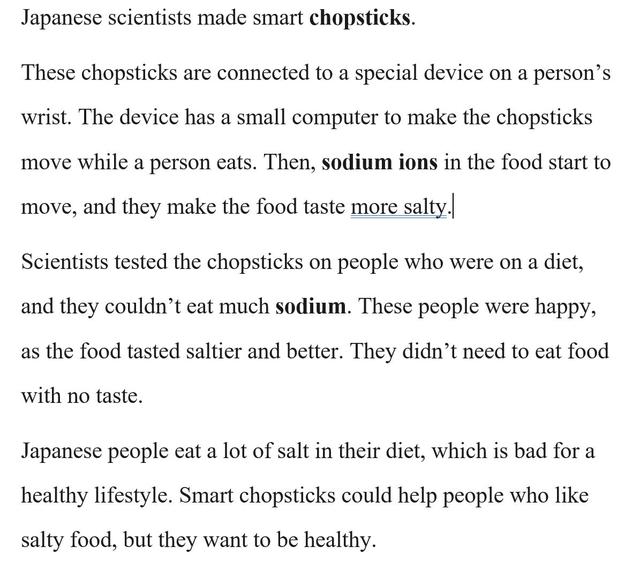Japanese scientists(科学家) made smart(智能的) chopsticks (筷子) .
日本科学家制造了智能筷子。
These chopsticks are connected to(与…联接) a special device (设备)on a person’s wrist (手腕) . The device has a small computer(核算机) to make the chopsticks move while a person eats. Then, sodium (钠) ions (离子) in the food start to move, and they make the food taste more salty (咸) .
这些筷子与一自个手腕上的特别设备相连。该设备有一台小型核算机,可以在人吃饭时移动筷子。然后,食物中的钠离子初步移动,使食物变得更咸。
Scientists tested the 
chopsticks on people who were on a diet(节食), and they couldn’t eat much sodium (钠) . These people were happy, as(因为) the food tasted(尝起来) saltier (咸) and better. They didn’t need to eat food with no taste(味道).
科学家们在节食的人身上查验了这种筷子,他们不能吃太多的钠。这些人很高兴,因为食物味道更咸非常好。他们不需要吃没有味道的食物。
Japanese people eat a lot of salt(盐) in their diet, which is bad for a healthy(安康的) lifestyle (日子方法) . Smart chopsticks (筷子) could help people who like salty (咸) food, but they want to be healthy.
日自己在饮食中摄入许多盐,这对安康的日子方法有害。智能筷子可以协助那些喜爱咸味食物
的人,但他们想要安康。
Difficult words: chopsticks (筷子) (a pair of sticks(棍状物) which people in Asia(亚洲) use to eat food),
sodium (钠) ion (离子) (a chemical (化学) which is important for some living things)
sodium (钠) (a soft silver-white(雪白色的) chemical (化学) which is a part of salt).
Word:
scientists(科学家)
smart(智能的)
connected to(与…联接)
device (设备)
wrist (手腕)
computer(核算机)
salty (咸)
diet(节食)
as(因为)
tasted(尝起来)
taste(味道)
salt(盐)
healthy(安康的)

lifestyle (日子方法)
sticks(棍状物)
Asia(亚洲)
chemical (化学)
silver-white(雪白色的)
sodium (钠)
ions (离子)

 微信扫一扫打赏
微信扫一扫打赏
 支付宝扫一扫打赏
支付宝扫一扫打赏



